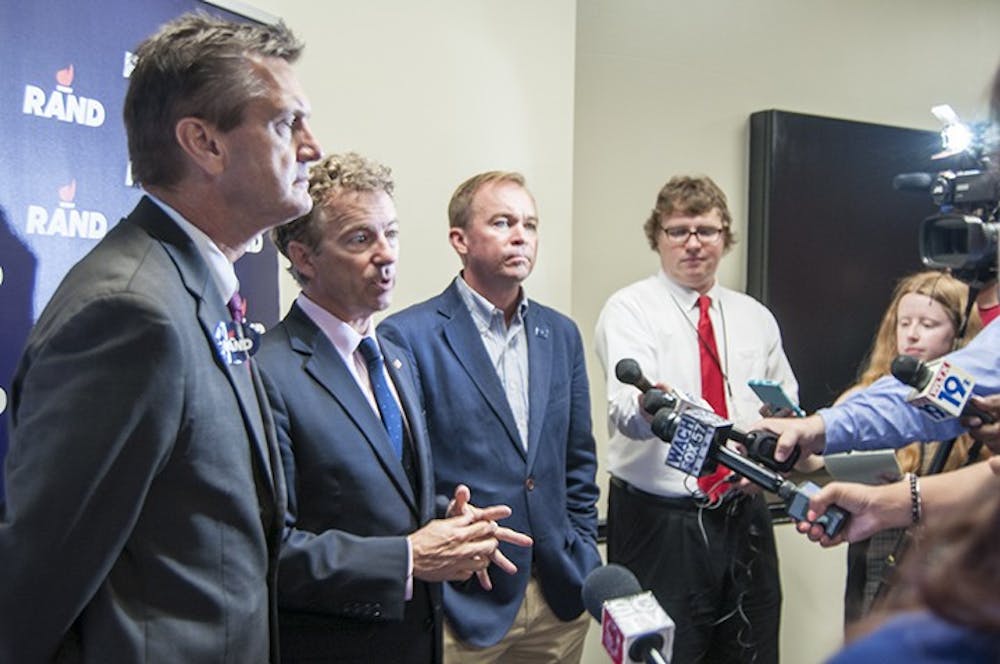Kentucky Sen. Rand Paul addressed a standing-room-only crowd Wednesday, Sept. 23 in the Russell House Ballroom alongside Rep. Mick Mulvaney and South Carolina State Sen. Tom Davis at an event organized by the USC chapter of Students for Rand (SFR).
The event was part of a broader campaign strategy by the Paul campaign to establish a foothold among college-age students, culminating in the founding of 350 chapters of SFR on college campuses in all 50 states.
Courtesy of SGTV
The first-term Libertarian spoke on myriad issues including the state of the Republican Party, foreign affairs, the criminal justice system and the economy.
Paul’s signature issue, and the one on which he hopes to connect with college-aged voters the most, remains personal privacy. He referenced the issue throughout his address and said that the ability of the government to access data from personal devices is especially relevant to the current generation of college students..
“Quite simply, the government does not need to be collecting all of our phone records,” Paul said. “It’s not that hard to get a warrant.”
The comments on privacy drew applause from the audience. Indeed, Paul’s positions and work on these issues are what drew Alex Fraley, a fourth-year exercise science student, to the event in support of the candidate.
“I like his ideas about liberty and protecting the Constitution,” Fraley said.
The portions of Paul’s address on the criminal justice system also drew a positive response from much of the audience. Paul spoke extensively on sentencing for non-violent offenses as well as the disparity of racial backgrounds amongst those imprisoned in the U.S., noting that he has become more aware of the role of race.
“I’ve learned that the people in jail [for drugs] are primarily black and brown,” Paul said. “3 out of 4 people in jail for non-violent crime are black or brown … It’s inadvertent, but it’s real.”
Paul also called out prominent politicians from both parties for what he referred to as “hypocrisy” with regard to the war on drugs.
“Look at the last several presidents: Clinton … George W. Bush, [Obama]. Do they really want to put people in jail for something they did?” he said. “If someone makes a mistake, they deserve a second chance.”
The senator’s deviation from the position of other candidates in the Republican field is part of what the campaign hopes will attract a younger constituency.
“I’ve been unafraid to stand up to leadership on either side of the aisle,” Paul told reporters before the event.
Fourth-year exercise science student Sara Boerin agreed with the senator’s analysis.
“He’s a different type of Republican, and he’s different than any of the other candidates so far,” Boerin said.
With regards to education, Paul affirmed his support for a voucher program that would allow students to choose the public school that they attend.
“I’d give every kid in America the choice to go where they want,” Paul said. “Anybody can have [a voucher], and anybody can go where they like.”
The Senator did not address the issue of college debt in his speech. He did, however, speak on the issues of the economy and national debt, taking aim at both Republicans and Democrats.
“There are different answers than you’ve been hearing from either side,” Paul said. “There are people who say, let’s try something simple in Washington, let’s only spend what comes in ... You’re going to learn that there’s an unholy alliance … and the ultimate compromise that will happen by the end of the year is that all spending will go up.”
The push to connect with the college crowd was also seen in the candidate’s foreign policy section. Paul noted that the majority of those who serve in combat for the US military are around college age and that this phenomenon makes politicians especially accountable to that demographic with regard to the handling of the military.
“When I look at war, and when I look at whether or not we should be at war, I think of you. It’s people your age,” Paul said. “It’s the responsibility of people of my age who are going to send people your age to war to think twice about it.”
Despite the Paul campaign's recent push to capture the 18-24 vote in order to makes strides in a crowded Republican field, Paul remains in eighth place both nationally and in South Carolina, according to the most recent Real Clear Politics poll. Additionally, voters in this demographic have historically low voter turnout, especially in primaries.
When asked whether this would be problematic for his campaign, Paul was quick to note that he believes the collegiate vote is difficult to measure and more powerful than many think.
“It’s hard to get [college students] to answer their phones for polls, so some of our polling data may be that we attract … a younger audience that doesn’t show up on the rolls, but there is strength there and there is strength in numbers,” Paul said. “We’re turning out more kids on campus than any other campaign and ... we’re going to work hard to get them registered and then we’re going to go pick them up.”

